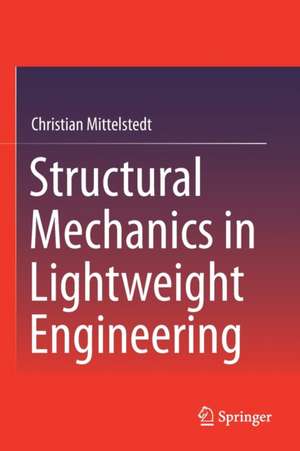Structural Mechanics in Lightweight Engineering
Autor Christian Mittelstedten Limba Engleză Paperback – 2 iul 2022
| Toate formatele și edițiile | Preț | Express |
|---|---|---|
| Paperback (1) | 546.81 lei 6-8 săpt. | |
| Springer International Publishing – 2 iul 2022 | 546.81 lei 6-8 săpt. | |
| Hardback (1) | 722.85 lei 6-8 săpt. | |
| Springer International Publishing – 2 iul 2021 | 722.85 lei 6-8 săpt. |
Preț: 546.81 lei
Preț vechi: 643.30 lei
-15% Nou
Puncte Express: 820
Preț estimativ în valută:
104.63€ • 114.01$ • 88.17£
104.63€ • 114.01$ • 88.17£
Carte tipărită la comandă
Livrare economică 23 aprilie-07 mai
Preluare comenzi: 021 569.72.76
Specificații
ISBN-13: 9783030751951
ISBN-10: 3030751953
Pagini: 674
Ilustrații: XVI, 674 p. 445 illus., 430 illus. in color.
Dimensiuni: 155 x 235 mm
Greutate: 0.95 kg
Ediția:1st ed. 2021
Editura: Springer International Publishing
Colecția Springer
Locul publicării:Cham, Switzerland
ISBN-10: 3030751953
Pagini: 674
Ilustrații: XVI, 674 p. 445 illus., 430 illus. in color.
Dimensiuni: 155 x 235 mm
Greutate: 0.95 kg
Ediția:1st ed. 2021
Editura: Springer International Publishing
Colecția Springer
Locul publicării:Cham, Switzerland
Cuprins
Introduction.- Theory of elasticity.- Plane problems.- Strength criteria for isotropic materials.- Strength criteria for isotropic materials.- Beams under transverse shear forces.- St. Venant torsion.- Warping torsion.- Work and energy.- Principle of virtual displacements.
Notă biografică
Univ.-Prof. Dr.-Ing. habil. Christian Mittelstedt studied civil engineering at the University of Wuppertal, Germany, where he received his engineering diploma in 1999. He defended his doctoral thesis about the mechanics of composite structures in 2005 at the University of Siegen, Germany, and joined the aerospace industry in northern Germany afterwards where he worked as research engineer from 2006 - 2011, and as a technical leader for research and development from 2011 - 2016. During his time in industry he defended his habilitation thesis about stability problems in thin-walled composite structures in 2012 at Technical University of Darmstadt. In 2016 he was appointed as full professor and as the head of the Institute for Lightweight Construction and Design (KLuB) at the department of Mechanical Engineering of the Technical University of Darmstadt.
Textul de pe ultima copertă
This book provides a comprehensive yet concise presentation of the analysis methods of lightweight engineering in the context of the statics of beam structures and is divided into four sections. Starting from very general remarks on the fundamentals of elasticity theory, the first section also addresses plane problems as well as strength criteria of isotropic materials. The second section is devoted to the analytical treatment of the statics of beam structures, addressing beams under bending, shear and torsion. The third section deals with the work and energy methods in lightweight construction, spanning classical methods and modern computational methods such as the finite element method. Finally, the fourth section addresses more advanced beam models, discussing hybrid structures as well as laminated and sandwich beams, in addition to shear field beams and shear deformable beams. This book is intended for students at technical colleges and universities, as well as for engineers in practice and researchers in engineering.
Caracteristici
Is a thorough introduction to energy methods in engineering Develops from essential basics to modern numerical simulation methods Provides a huge number of exercises complete with solutions
